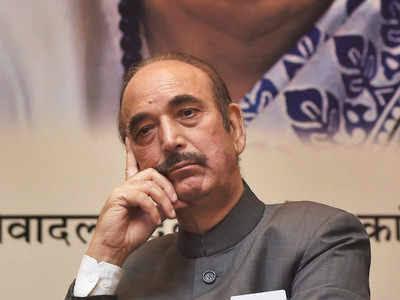Jammu: For the second time in 27 years, Jammu and Kashmir will have no representation in Rajya Sabha from February 15 when all four members in the Upper House of Parliament from Jammu and Kashmir will retire.



The Rajya Sabha has issued notification on retirement of four members from J&K including Leader of Opposition Ghulam Nabi Azad, who is a member of the House since 1996 barring two and half years stint as the J&K Chief Minister.
There are four MPs representing Jammu and Kashmir in the Rajya Sabha including Azad (Congress), Shamsher Singh Manhas (BJP), Fayaz Ahmad Mir and Nazir Ahmad Laway (PDP).
Azad and Laway will complete their six years term on February 15 while Mir and Manhas will retire on February 10.
With this, Jammu and Kashmir will lose representation in the Rajya Sabha and there are no early chances of the Union Territory again sending its members to the House of Elders as the Assembly elections are no way near.
Only when the Assembly elections are held, the elected MLAs will fill four seats of Rajya Sabha from Jammu and Kashmir and till then the seats will remain vacant.
With four retirements in Rajya Sabha, Congress and PDP will not have any representation in Parliament from Jammu and Kashmir as they have no members in Lok Sabha. However, National Conference has three MPs and BJP two in Lok Sabha from J&K.
In the Jammu and Kashmir Reorganization Act, the Union Ministry of Home Affairs had allotted 90-member Assembly, five Lok Sabha and four Rajya Sabha seats to the Union Territory, Ladakh was given one Lok Sabha seat. As Ladakh wasn’t given Legislature, it won’t have any Rajya Sabha seat too.
This will be for the second time in last 27 years that there will be no Rajya Sabha member from Jammu and Kashmir. As J&K was under President’s Rule from 1989 to 1996, the Rajya Sabha members from the then State had retired in 1992 and 1994.
While Mufti Mohammad Sayeed and Shabir Ahmad Salaria had competed their term in October 1992, Ghulam Rasool Mattoo and Rajendra Prasad Jain had retired in April 1994 after their six years term.
From April 1994 to October 1996, there was no representative from Jammu and Kashmir in the Rajya Sabha. However, after the Assembly elections and formation of Government by Dr Farooq Abdullah-led National Conference in October 1996, Dr Karan Singh, Ghulam Nabi Azad, Saif-ud-Din Soz and Sharif-ud-Din Shariq were elected to the Rajya Sabha from J&K in November 1996.
In fact, Leader of Opposition in Rajya Sabha Ghulam Nabi Azad almost remained a member of the Upper House since then barring two-and-half-year period when he was appointed as the Chief Minister of Jammu and Kashmir heading the Congress-PDP coalition Government.
Senior Congress leader from Karnataka Malikarjun Kharge is front-runner for the post of the Leader of Opposition in Rajya Sabha. Kharge was leader of Congress Party in Lok Sabha from 2014-19 but had lost the election in 2019 Parliamentary polls in Karnataka and was elected to the Rajya Sabha later.
All four Rajya Sabha members from Jammu and Kashmir retiring between February 10-15 had been elected in the elections held for four seats in February 2015 during Governor’s Rule after Assembly elections in November-December 2014. The PDP-BJP had formed the Government on March 1, 2015 after stitching an alliance as well as the Common Minimum Programme.
Three members-two from PDP and one BJP-were elected while Azad was the lone Opposition member to make it to the Rajya Sabha with the support of National Conference and some Independents.
After completion of term of four Rajya Sabha members, Jammu and Kashmir will have five Lok Sabha members in the Parliament including Union Minister of State in Prime Minister’s Office (PMO) Dr Jitendra Singh and Jugal Kishore Sharma, both BJP, Dr Farooq Abdullah, Mohammad Akbar Lone and Hasnain Masoodi, all three from National Conference.
Ladakh, now a separate Union Territory, is represented in Lok Sabha by BJP MP Jamyang Tsering Namgayal.

